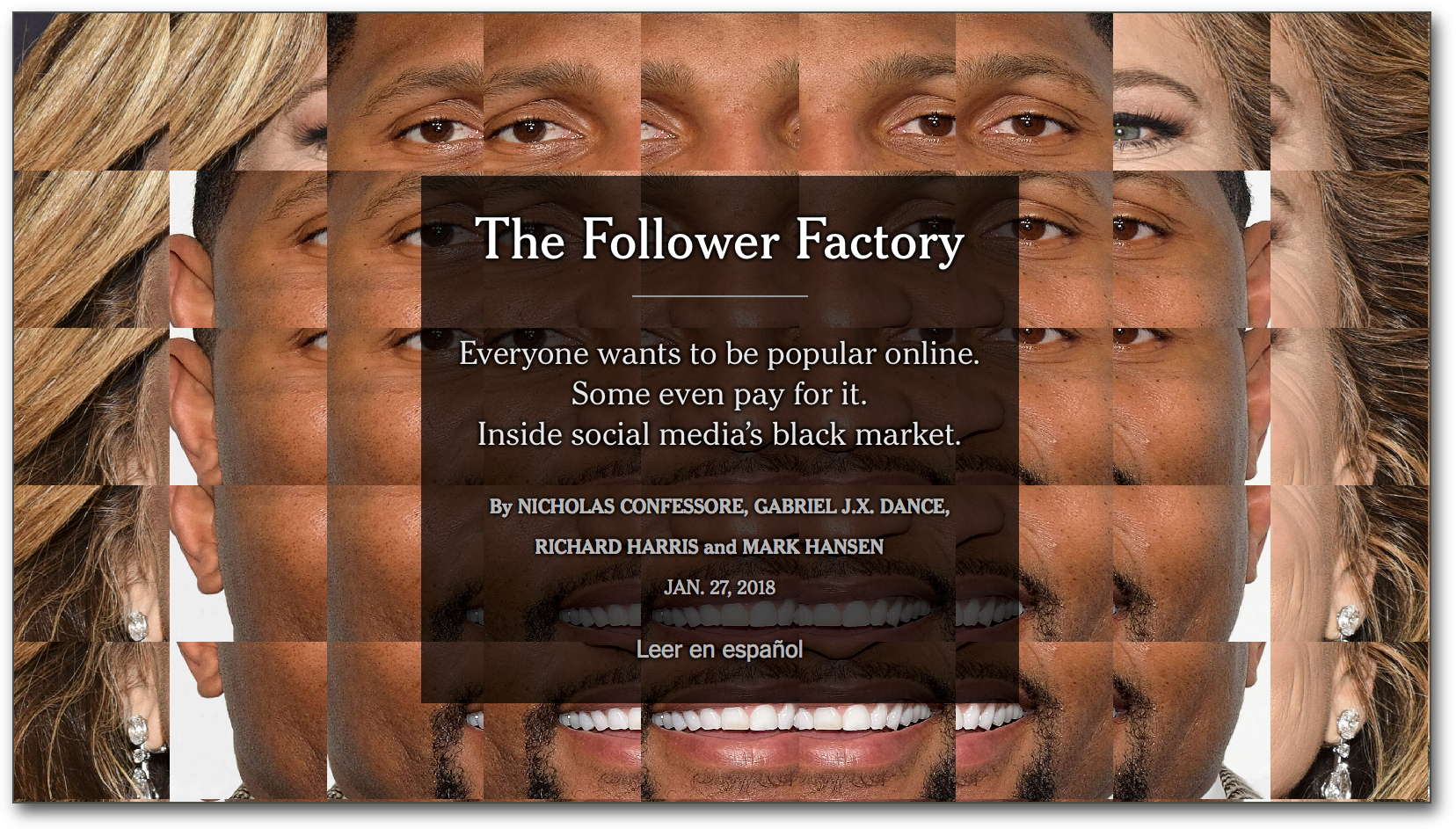
Fake Followers: the black market in cargo cult influencers
There’s a great piece of reporting from the New York Times that’s been, quite deservedly, doing the rounds for the last couple of days, exposing the seedy underbelly of the influencer economy. It’s been an open secret amongst the social media cognoscenti that many so-called influencers buy their way to positions of apparent importance, but this is the first really big mainstream exposure of it.
There is very little in the article that should surprise anyone who has been paying attention to the growth of “social media influence” over the past decade. There have been plenty of examples of people who used services to inflated their seeming influence on social media. A personal favourite was the Tory MP who used to follow me and then unfollow me every three days, like clockwork. He was clearly using a service that used automated following to encourage people to follow back, before he quietly unfollowed them, to create a more powerful-looking semblance of influence.
What’s interesting is that this is moving the conversation out of social media specialist circles, and into the wider public sphere. And some people will be panicking, as their status of customers of Devumi — a company that sells followers, Likes et al — was revealed:
The Times reviewed business and court records showing that Devumi has more than 200,000 customers, including reality television stars, professional athletes, comedians, TED speakers, pastors and models. In most cases, the records show, they purchased their own followers. In others, their employees, agents, public relations companies, family members or friends did the buying. For just pennies each — sometimes even less — Devumi offers Twitter followers, views on YouTube, plays on SoundCloud, the music-hosting site, and endorsements on LinkedIn, the professional-networking site.
Once you buy into the idea that as nebulous a concept as “influence” can be boiled down to simple numbers – followers, likes, retweets — this is the obvious result.
Buying fake influence you can sell
People game those numbers however they can, because there are both social and financial rewards for doing so:
High follower counts are also critical for so-called influencers, a budding market of amateur tastemakers and YouTube stars where advertisers now lavish billions of dollars a year on sponsorship deals. The more people influencers reach, the more money they make. According to data collected by Captiv8, a company that connects influencers to brands, an influencer with 100,000 followers might earn an average of $2,000 for a promotional tweet, while an influencer with a million followers might earn $20,000.
There’s a nasty vicious circle at play here. The more fake followers you have, the more you have to pay to maintain the illusion of influence. This is acutely true in algorithmically-driven systems like Facebook or Instagrams, where bot accounts are significantly less likely to Like your content. Thus, you have to pay for Likes to compensate for the inactive bots in your followers driving down your content in the feed by their inactivity.
Nice business model for the peddlers, though. It reminds me strongly fo Black Hat SEO – once you start down that path, you have to keep paying just to stand still. And if your living is based on your cargo cult influence, you have to keep doing it, or the illusion falls apart.
(An aside: If you’re buying influencer marketing services, buy — or measure — by results, not by simple numbers, because so many of those numbers are completely fictional.)
The indefensible Martha Lane-Fox
One repeat customer of the service has been Martha Lane-Fox, who has charted a neat course from dot.com startup to government digital guru, and cross-bench peer. Oh, and she sits on Twitter’s board:
Similarly, Ms. Lane Fox, a British e-commerce pioneer, member of Parliament and Twitter board member, blamed a “rogue employee” for a series of follower purchases spanning more than a year. She declined to name the person.
It’s an interesting defence — because it looks bad either way. If she’s been buying followers herself to boost her profile on the service, well, that’s clearly bad. But even if her excuse is accurate, it means she’s not really a user of the service whose board she sits on: she’s paying someone to do it for her. So much for transparency. It’s also a reminder of the telling fact that many people who run these social media services aren’t actually users of them: look at Mark Zuckerberg. Zuck has a team running his Facebook account for him.
The Black Market in Bots
What’s worth noting is that the company profiled here is the tip of an iceberg. As I suggested earlier, this is just further proof that the fake follower sellers are essentially a reincarnation of the spammy end of black hat SEO, reborn for the social media age. They’re dodgy marketing support businesses, but they sit atop a much bigger set of companies generating and selling on the bots that are used in these transactions:
Devumi, according to one former employee, sourced bots from different bot makers depending on price, quality and reliability. On Peakerr, for example, 1,000 high-quality, English-language bots with photos costs a little more than a dollar. Devumi charges $17 for the same quantity.
This is deception on a massive scale – and we’re all susceptible to being manipulated by it, thanks to a little factor called social proof. Simply put, we can’t help but take into account numbers like flow counts and retweets when we assess the value of a piece of content or a person on social media. Thus, there is a manifest value in being able to buy that social proof more cheaply than you could organically develop it yourself. It’s taken me over a decade to amass more than 8,000 Twitter followers — but I earned them naturally.
Devumi actually markets social proof as a core part of its offering.
Possibly the biggest irony of all is that some of these “influencers”, who have merely cargo-culted an appearance of influence, are still trumping the virtues of a real connection with people over social media:
“My social media following exploded,” Mr. Sehdev claimed, because he had discovered the true secret to celebrity influence: “Authenticity is the key.”
Authentically getting your credit card out, and buying some bot follows, perhaps. But there’s very little that’s authentically social here.
Sign up for e-mail updates
Join the newsletter to receive the latest posts in your inbox.










